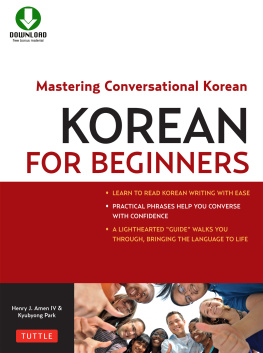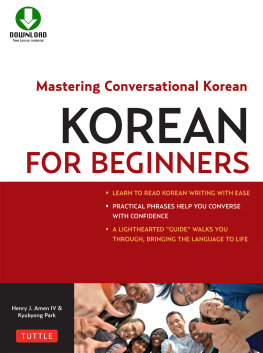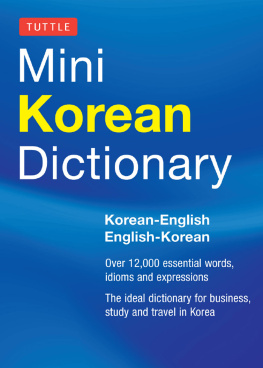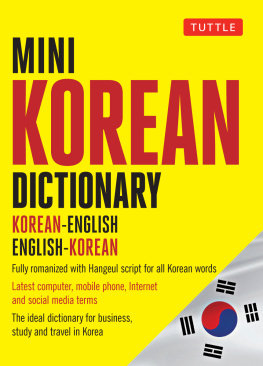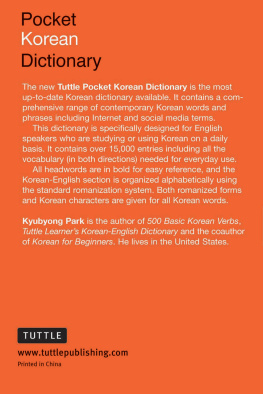The authors wish to express many thanks to their wives, not just for their support during the process of writing the book, but also for their direct participation: Soyoung Nam assisted in the creation of the audio and video material, and Aya Padrn provided the illustrations that help bring Korean for Beginners to life. We would also like to give our heartfelt thanks to our editor, Sandra Korinchak, for her invaluable guidance.
English | Korean | Meaning | Example |
adjective | a modifying part of speech, typically helping to describe a noun | The squid tastes delicious. . |
adverb | a modifying part of speech, typically used to give information on how an action (verb) is carried out | I quickly ate my squid. . |
article | in English, a short word that helps identify a noun; these do not exist in Korean | See the squid swimming in the tank? ? |
aspiration | a pronunciation technique in which a puff of air is released along with the sound(s) | The characters and are aspirated. . |
batchim | in Korean, a consonant that appears in the third position of a syllable; often, special pronunciation rules are associated with them | How do you pronounce the batchim ? ? |
comparative | a grammatical tool to show a comparison between two things; affects adjectives and adverbs | My squid is more delicious than yours. . |
conjugation | rules governing how verb forms are created to show grammatical features like person and tense | How do you conjugate the verb to walk in the present tense? ? |
conjunctive adverbs | words that connect two different clauses or sentences to show the meaning between them; usually referred to in English as conjunctions | I ordered a lot of squid, but I couldnt eat all of it. . OR
. . |
consonant | a letter or character representing a consonant sound (as opposed to a vowel) | The letter b is the first consonant in the English alphabet. b . |
contraction | the shortening and joining of two words or sounds to make their pronunciation easier | I simply cannot cant get enough of this delicious squid. . |
declarative (indicative) | a type of sentence that states information | I love squid. . |
demonstrative pronoun | a word that singles out or points to a noun | You eat this squid, and Ill eat that one. . |
diphthong | the combination of two or more vowel sounds to create one new one | The vowel sound in boy is [o] + [i], a diphthong. boy [o] [i] . |
ending | a set pattern attached to the stem of a verb in order to create meaning through conjugation | Most verbs in English are conjugated into the past tense with the ending -ed. -ed . |
future | () | a verb tense indicating something that hasnt happened yet | I will finish my plate of squid. . |
homonym | a word with the same spelling and sound as another but a different meaning | Band (e.g., a rock band) and band (e.g., a rubber band) are homonyms.
.
|
homophone | a word with the same sound as another but a different spelling and meaning | Bare and bear are homophones. bare bear . |
honorific | verb conjugations and special words used in Korean to show respect to the person youre talking to and/or about | You dont need to use honorifics when talking to your squid. . |
imperative | a type of sentence that gives a command | Love your squid! ! |
infinitive | the most basic, unconjugated form of a verb | Infinitives in English are signified by the word to and in Korean by the ending -. to , - . |
inquisitive (interrogative) | a type of sentence that poses a question | Do you love squid? ? |
modifier | a word or other grammatical element that describes or qualifies another | Adjectives and adverbs are considered modifiers in English. . |
noun | a part of speech representing people, places, and other physical and abstract objects | Id like more squid , please. . |
object | a noun that receives the action in a sentence | We ate squid. . |
omission | the removal of sentence elements that are unnecessary because they are already understood | Its okay to omit the subject of a Korean sentence if it can be understood from the context. . |
particle | a Korean grammar element, usually attached to nouns, that adds meaning to and/or signifies the grammatical function of a word | The object particle - / - signifies that a noun is an object. - / - . |
past | () | a verb tense indicating something that has already happened | I finished my plate of squid. . |
personal pronoun | a word that singles out or points to a person | I will eat my squid, and you eat yours. . . |
plain | verb conjugations and words used when you dont need to show respect to the person youre talking to and/or about | You can use plain forms when talking to your squid. . |
possessive | word forms that indicate ownership of something | The leftover squid is Hal s , not mine . . |
predicate | the second part of a simple sentence, used in this book to describe how two nouns or a noun and an adjective are linked by the verb to be | Squid is delicious. . |
preposition | in English, words used in conjunction with nouns to add meaning; in Korean, particles perform this role | Lets eat squid at the restaurant on the corner. . |
present | a verb tense indicating something ongoing or habitual | I always finish my plate of squid. . |
progressive | a verb tense indicating something in the process of occurring | I am eating squid right now. . |
propositive | a type of sentence that makes a suggestion or proposal | Lets eat some squid. . |
stem | the base of a verb that doesnt change and onto which conjugative endings are added | The stem of the verb to love is lov-. to love lov- . |

